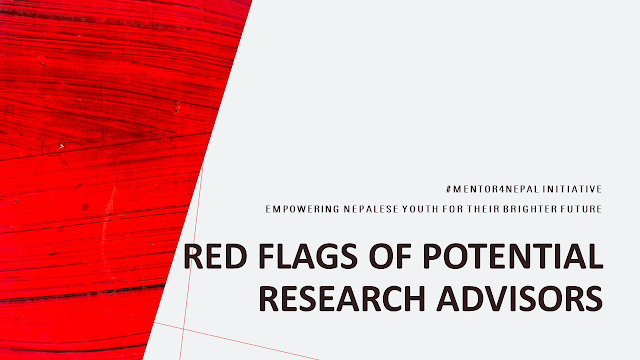Red flags of potential research advisors
Choosing a research advisor is one of the most important decisions you will make as a graduate student. Your advisor will be your mentor, guide, and support system for the next few years, so it is essential to choose someone who is a good fit for you.
There are a few red flags that you should be aware of when choosing a research advisor. These are signs that the advisor may not be a good fit for you or that they may not be the best person to help you succeed in your graduate studies.
Here are some of the red flags of potential research advisors:
- They are not publishing. Research is a key part of a professor's job, and if they are not publishing their research, it is a sign that they may not be active in their field. This could also mean that they are not getting funding for their research, which could make it difficult for you to get the resources you need to succeed.
- Their students are not publishing. The same goes for their students. If the advisor's students are not publishing their research, it is a sign that the advisor may not be giving them the support they need to succeed.
- Their current students are not happy. Talk to the advisor's current students and get their feedback on the advisor. If they are not happy with the advisor, it is a sign that you may not be either.
- They won't let you talk to current or past students. A good advisor should be open to you talking to their current and past students. If they refuse to let you do this, it is a red flag that they may be trying to hide something.
- Very few of their students have graduated. The average time to graduate from a PhD program is 5-7 years. If the advisor has very few students who have graduated, it is a sign that they may not be good at mentoring students.
- They are hard to get ahold of. A good advisor should be available to meet with you and answer your questions. If they are hard to get ahold of, it is a sign that they may not be supportive or that they may not be interested in your success.
- Other people say only negative things. Talk to other people in the department and get their feedback on the advisor. If you hear only negative things, it is a sign that you should avoid the advisor.
- You don't get on during the interview. The interview is your chance to get to know the advisor and see if they are a good fit for you. If you don't get on during the interview, it is a sign that you should not work with the advisor.
- They don't talk specifics about funding. Funding is essential for graduate students, so it is important to make sure that the advisor has a plan for funding your research. If they don't talk specifics about funding, it is a sign that they may not be serious about your research.
Additional points:
- Normalizing weekend/holiday work
- Referring to PhD students as "kids"
- Calling getting a non-ac job "selling out"
- Discouraging internships
- Non-ac career advice from academics
- When a PI's lab alumni are unreachable
- Lab members don't eat lunch
- Lab members don't do conferences
- Lack of scheduled meetings
- Vague funding situation
- PI is busy with the company they run
- PI doesn't take time off
- PI rambles a lot
These are just a few of the red flags of potential research advisors. It is important to do your research and talk to people in the department before making a decision. Choosing a good research advisor is essential for your success in graduate school, so don't take it lightly.
Additional link:
- https://www.reddit.com/r/PhD/comments/vhclq4/what_are_some_red_flags_of_potential_research/
- https://www.reddit.com/r/PhD/comments/zw3c9d/developing_a_checklist_to_identify_phd_advisor
- https://twitter.com/LifeAfterMyPhD/status/1692288238285930816
- https://twitter.com/LifeAfterMyPhD/status/1694353071282000156



Comments
Post a Comment